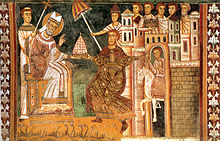Today is the seventh day of the Octave of the Nativity (and of course New Year's Eve, a good time to reflect on the past year and plan for the new....).
It is also the memorial of Pope St Sylvester I, who may be of interest due to the use of a life of the pope in the Rule of the Master (though not St Benedict's Rule).
Pope St Sylvester
St Sylvester was pope between 314 and 335, encompassing the period in which Constantine granted the Church official status in the Empire and the Council of Nicaea. We know that during his pontificate, a number of the great churches were founded at Rome, including St. John Lateran, Santa Croce in Gerusalemme, Old St. Peter's Basilica, and several cemeterial churches built over the graves of martyrs. We also know that St Sylvester did not attend the First Council of Nicaea in 325, but he was represented by two legates, Vitus and Vincentius, and he approved the council's decision.
Beyond this, however, it is difficult to separate fact from fiction, due to the confusion created by the early sixth century life, composed around 501-508 in order to bolster the case of Pope Symmachus during the Laurentian schism.
Vita beati Silvestri
The Rule of the Master quotes from the Vita Beati Silvestri, and the great advocate of the Rule of the Master, Dom Adalbert de Vogue, saw this as evidence of the Master's Roman and early sixth century origins. In fact though, if anything, it rather points to a somewhat later date for that Rule.
The Vita beati Silvestri, part of the 'Symmachean forgeries', has been preserved not just in Latin but also in Greek and Syriac, and includes an account of an alleged Roman council, as well as relating St Sylvester's close relationship with the first Christian emperor. The material also appears in the later forgery, the Donation of Constantine.
According to the Life, the Emperor Constantine was cured of leprosy by the virtue of the baptismal water administered by Sylvester. The Emperor, abjectly grateful, not only confirmed the bishop of Rome as the primate above all other bishops, he resigned his imperial insignia and walked before Sylvester's horse holding the Pope's bridle as the papal groom. The Pope, in return, offered the crown of his own good will to Constantine, who abandoned Rome to the pope and took up residence in Constantinople.
The story quickly gained wide circulation, with St Gregory of Tours, for example, referring to it in his history of the Franks, written in the 580s.

No comments:
Post a Comment